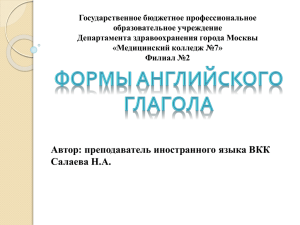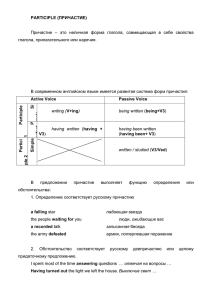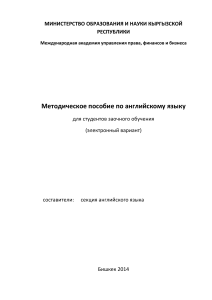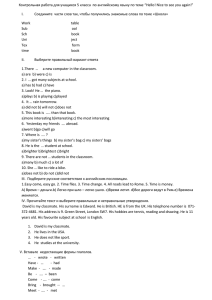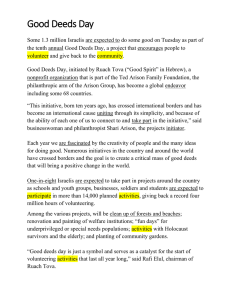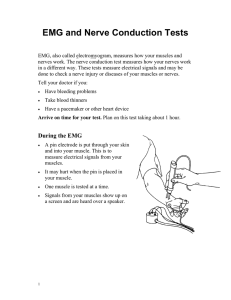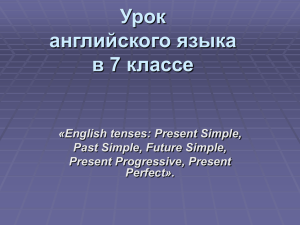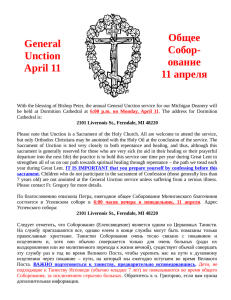Kommentarii_konkyrsnaya_rabota
advertisement

НОУ СПО «Семеновский колледж экономики и менеджмента» Грамматический комментарий по Английскому языку для студентов обучающихся по программам среднего профессионального образования Разработчик: преподаватель английского языка Тихомирова Н.К г.Семенов 2014 год. Грамматические комментарии Личные местоимения I You He She Я Ты, вы Он Она It We They Оно Мы Они Указательные местоимения Единственн ое число Множестве нное число this (этот, эта, это) this week, this file that (тот, та, то) that week, that file these (эти) those (те) these weeks, these files those weeks, those files Обозначает то, что ближе к говорящему во времени и пространстве Обозначает то, что дальше от говорящего во времени и пространстве Артикли Неопределенный артикль a (an) Употребляется только с исчисляемыми существительными в единственном числе для: 1. Выражения значения единичности 2. Классификации лица или предмета (имеет значение «любой»). A student must work hard. I have a dog. Определенный артикль the Употребляется со всеми типами существительных (исчисляемыми и неисчисляемыми) как в единственном числе, так и во множественном числе. Определенный артикль конкретизирует предмет, т.е. выделяет его из ряда ему подобных. Он употребляется если: 1. Ситуация или контекст показывает, что речь идет об определенном предмете или лице. 2. Слово упоминалось ранее. 3. С прилагательными в превосходной степени. 4. С некоторыми географическими названиями. 5. С фамилией во множественном числе для обозначения всех членов семьи. The Urals, the best, the Smiths. The day is fine. She has a new car. The car is red. Глагол to be (быть) Настоящее время Present Simple I am You are He She It We They are is Прошедшее время Past Simple I was You were He She It was We They were Будущее время Future Simple I You He She It will be will be will be We They My father is a teacher. My grandfather was a doctor. My sister will be a student. will be Настоящее время Present Simple Вопросительная форма Отрицательная форма Единственное число Am I? Is he? Is she? Is it? I am not (I’m not) He is not (he isn’t) She is not (she isn’t) It is not (it isn’t) Множественное число Are we? Are you? Are they? We are not (we aren’t) You are not (you aren’t) They are not (they aren’t) Пример Is you father a teacher? Are your children tall? Прошедшее время Past Simple Вопросительная форма Отрицательная форма Единственное число Was I? Were you? Was he? Was she? Was it? I was not (I wasn’t) You were not (you weren’t) He was not (he wasn’t) She was not (she wasn’t) It was not (it wasn’t) Множественное число Were we? Were you? Were they? We were not (we weren’t) You were not (you weren’t) They were not (they weren’t) Пример Were you at the Institute yesterday? Was she a doctor? Будущее время Future Simple Вопросительная форма Отрицательная форма Единственное число Will I? Will you? Will he? Will she? Will it? I will not (I won’t) You will not (you won’t) He will not (he won’t) She will not (she won’t) It will not (it won’t) Множественное число Will we? Will you? Will they? We will not (we won’t) You will not (you won’t) They will not (they won’t) Пример Will you be a teacher? I won’t be a teacher. Глагол to have (have got) Настоящее время Present Simple Утвердителььная форма Вопросительная форма Отрицательная форма I have/have got We have/have got You have/have got They have/have got Have I got …? Have we got …? Have you got …? Have they got …? I haven’t got … We haven’t got … You haven’t got … They haven’t got … He has/has got She has/has got It has/has got Has he got …? Has she got …? Has it got …? He hasn’t got … She hasn’t got … It hasn’t got … They have got two pets. Have they got two pets? They haven’t got two pets. Прошедшее время Past Simple Утвердителььная форма Вопросительная форма Отрицательная форма Единственное число I had You had He had She had It had Had I ? Had you ? Had he? Had she? Had it? I hadn’t not … You hadn’t not … He hadn’t not … She hadn’t not … It hadn’t not … Множественное число We had You had They had Had we? Had you? Had they? We hadn’t not … You hadn’t not … They hadn’t not … She had a pet. Had she a pet? She hadn’t a pet. Будущее время Future Simple Утвердителььная форма Вопросительная форма Отрицательная форма I will have You will have He will have She will have It will have Will I have? Will you have? Will he have? Will she have? Will it have? I will not (won’t) have You will not (won’t) have He will not (won’t) have She will not (won’t) have It will not (won’t) have We will have You will have They will have Will we have? Will you have? Will they have? We will not (won’t) have You will not (won’t) have They will not (won’t) have She will have a pet. Will she have a pet? She won’t a pet. Типы вопросов В английском языке четыре основных типа вопросов: Общие вопросы (general questions) Специальные вопросы (special questions) Альтернативные вопросы (alternative questions) Разделительные вопросы (disjunctive questions) Общий вопрос задается тогда, когда мы хотим спросить, происходит, происходило или произойдет ли событие, выраженное сказуемым вопросительного предложения. Are you happy? Is she at school? Глаголсвязка Подлежащее Основная часть сказуемого ? Если сказуемое выражено глаголами to be или to have, которые в этом предложении являются смысловыми, то вопросительное предложение строится без вспомогательного глагола по схеме: Глаголы to be, to have Подлежащее ? Has he (got) a book? Специальный вопрос задается, когда мы хотим узнать, кто совершает действие, где, когда, почему, при каких обстоятельствах это происходит. Специальный вопрос начинается со специального вопросительного слова: Who (кто) Whom (кого) What (что, какой) Which (который) Whose (чей) When (когда) Where (где, куда) Why (почему) How long (как долго) How (как) How many (сколько) How much (сколько) Основные схемы специального вопроса*: (* вопрос не относится к подлежащему) Вопросительное слово Глагол to be, to have как смысловые Подлежащее is Peter? Where Вопросительное слово Where Вспомогательный глагол Подлежащее Смысловой глагол does Peter live? Второстепенные члены предложения Когда вопрос относится к подлежащему или определению к подлежащему, то у этих специальных вопросов прямой порядок слов. Who reads books in the evening? LESSON 1 Типы предложений. Порядок слов в предложениях. Глаголы “to be” и “to have” в настоящем, прошедшем и будущем временах. Структуры “to be going to do smth”, “to be fond of smth”. Общие и специальные вопросы. Артикли: определенный, неопределенный, нулевой. Личные местоимения. Указательные местоимения this / that, these / those. Text 1 A book. It is a book. Is it a book? Yes, it is. No, it is not. What is it? A chair. This is a chair. Is this a chair? Yes, it is. No, it is not. What is this? A pencil. Is that a pencil? Yes, it is. No, it is not. What is that? This is the floor. That is the ceiling. This is the door and that is the window. This is the wall and that is the wall, too. It is a blackboard. It is a duster. Is that a book? – Yes, it is. Is this a pen? – No, it isn't. It is not a pen. It's a pencil. The blackboard is black. The chalk is white. This desk is brown. That piece of paper is yellow. These pencils are green and those pencils are blue. These are green pencils. Those are blue pencils. Is that pen red or green? It is red. Is the bag brown? No it isn't. It is yellow. Is that a blue box? No, it isn’t. It is a red box. Is this piece of chalk white? Yes, it is. Text 2 Прочитайте текст, переведите его и ответьте на вопросы. Переделайте текст, поставив глаголы “to be” и “to have” в прошедшее и будущее время. My name is Susan. I am twenty. I am a first-year student at Glasgow University. I’m going to become an economist. It’s a very interesting profession. I’m not married, because I’m so young. My family is not large. We are five: my mother, my father, my grandmother, my sister and me. My father is a teacher. He is very clever. He is like a walking dictionary. He is keen on foreign literature, he is interested in sciences. My mother is younger than my father. She is always full of joy and energy. She is a housewife and is good at cooking. My grandmother is quiet and thoughtful. She is well-read. She has a lot of books on her shelves. My sister Mary is a lovely girl. She is well-bred and always well-dressed. Foreign languages are her hobby. She is going to master French. We have many relatives: three uncles, two aunts, six cousins. My best friend is Ann. She is modest and honest. She is good at painting. Questions 1. 2. 3. 4. 5. 6. 7. 8. What’s your name? How old are you? What are you going to be? Are you married? Why aren’t married? Is your family large? How many are you in the family? What is your father? What is your father interested in? 10. Is Mary always welldressed? 11. What language is Mary going to master? 12. How many relatives have you got? 13. Who is your best friend? 14. What is she good at? 9. Text 3 Read the text and try to tell your group-mates about your relations My Relations My mother has six sisters. Her elder sister lives in Moscow. Her name is Maria. Aunt Maria is a teacher. Her husband is a technician. His name is Michael but we call him uncle Mike for short. His hobby is radio repairing. My aunt and uncle have four children: three sons and a daughter. I am on friendly terms with my cousins. My cousin Andrew is married. He is an electrician. His wife is a tailor. They have two children, they are twins. My second cousin Nick lives in the country. He is a technician at the transport services. He is married too. His wife is a nurse in the kindergarten. In summer we go to the country on our holidays and stay at Nick’s. Text 4 Read the text. Answer the questions given below and retell the text. About Mr. Brown, a Teacher This is Mr. Brown. He is English. He is from Great Britain. He is from London. Mr. Brown is not single. He is married. He is forty-five years old. He is a quiet, good-looking man, tall, handsome, rather thin, with curly brown hair and dark grey eyes. Mr. Brown is a teacher. He is a teacher of London University. He is there on Monday, Tuesday, Thursday and Friday. On Wednesday he is at home in his rich, cosy family library. He is busy with reading scientific books and newspapers, journals and magazines, writing articles and reports. Saturday and Sunday are his days off. His hobby is music and gardening. Questions 1. Where is Mr. Brown from? 6. On what days is he at University? 2. Is Mr. Brown single or married? 7. What is he busy with? 3. How old is he? 8. 4. What does he look like? What are his days off? 9. What is his hobby? 5. What is Mr. Brown’s occupation? Text 5 Read and translate the text in writing. The Browns Mr. Brown’s family is not large. There are four of them: his wife, his son, his daughter and him. His wife, Mrs. Brown, is a pleasant looking woman. She is forty. She has warm brown hair and soft dark brown eyes. She is kind and gentle. She has much work to do about the house. Mr. Brown is a little unpractical. Mrs. Brown, on the other hand, is very practical and full of common sense. The Browns haven’t many children, only two: John and Mary. John is seventeen and six foot tall. He is at University. He has a lot of books in his room. He is a clever, hard-working student, a first class footballer, boxer and runner. He hasn’t much time to spare. He is strong, quiet and thoughtful like his father. His sister Mary is only twelve. She is a lovely girl. She has golden hair and dark blue eyes. She is always bright and happy, full of joy. She is at school. She has much homework to do. She has a pet, it’s a parrot. The family is very friendly, they have much in common. Every time they are together, they are happy. Questions 1. Is Mr. Brown’s family large? 2. How many are they in the family? 3. How old is Mrs. Brown? 4. What is she like? 5. What is she? 6. How many children have the Browns? What is their son’s name? 8. How old is John? 9. What is his occupation? 10. What has he in his room? 11. What is he like? 7. 12. Is he like his father or his mother? 17. Has she much or little homework? 13. Has he much or little time to spare? 18. What Pet has Mary? 19. Is everyone in the family happy? 20. Have they much or little in common? 21. Is the family friendly? 14. What is the daughter’s name? 15. How old is she? 16. She is at school, isn’t she? ORAL PRACTICE Learn the dialogues by heart. Act them down. 1 Tom, who is this good-looking, chestnut-haired young lady? Oh, it's my sister. And who is this pretty girl with rosy plump cheeks and a turned-up nose? It's her elder daughter, my niece. Well, you have such pleasant-looking relatives. Thank you. 2 What is the name of your younger brother? John. Really? Fantastic, we both have a brother John by name. Why? John is such a popular name. 3 Look, Jane, have you got a family of your own? Oh, no, I'm not married yet. I live with my parents. Is your family large? I don't think so. My parents have got only two daughters. And which of you is the eldest? It's me. I'm twenty. How old is your younger sister? I wonder what her name is? Susan. She's a lovely girl. She is ten. It's a pleasure to have such a young sister, isn't it? Certainly. She's the apple of my eye. Translate the dialogue from Russian into English. Это миссис Браун? У нее большая семья? Да. Сколько у нее детей? Четверо: две девочки – Мэри и Бетси, и два мальчика – Билл и Джон. Мэри старшая? Да, ей 16 лет. А сколько лет Джону? Он еще маленький, ему еще нет трех. Брауны очень приятные люди. Да, очень. М-р Браун – великолепный отец, а миссис Браун – очень любящая мать. Translate the replies from Russian into English. Hello, Kate. Let me introduce my friend Barbara, she is from Nottingham. Здравствуйте, Барбара. Рада познакомиться с вами. Вы здесь по делу? Pleased to meet you too. You are right, I'm on business here. I'm a nurse and I'm on practice at hospital now. Вы очень заинтересованы в своей профессии? И я думаю, вы очень хороший специалист. Да, я люблю свою профессию. Мои родители – врачи. И я тоже собираюсь стать врачом. My parents are journalists. But I'm not a journalist. I'm going to be a lawyer. Translate the replies from Russian into English. What are you going to be after school, Jack? Я собираюсь стать инженером. Мне очень нравится математика, физика, компьютеры. А ты? Я бы хотела стать актрисой. Это такая интересная профессия, и я хочу петь, танцевать, встречаться со многими людьми. Oh, you are wrong then. I think, it's very hard to be a good actress, and a person should have a lot of special talents. Act out the dialogue. Learn it by heart. Good evening, Helen, dear! I’m very glad to see you. Good evening, Pamela! How are you and your son? We are very well, thank you. My son is a lawyer now. Oh, I am very glad to hear that. And my children are still students. You know, Helen, my George is a married man now. His wife’s name is Sarah. She is very nice and young. How old is she? Nineteen. She is a student. I’m very glad for the young couple. Best regards to George and Sarah. Thank you, good bye Good bye
